I've
been a member of several Rottweiler on-line forums for some time. One of the most
common questions I see asked on the forums is "how do I get my puppy to stop biting
and challenging me?" I smile when I read such posts because the person asking the
question has never raised a Rottweiler before and thinks their dog is going to grow
up to be vicious. While the first may be true - the person hasn't raised a Rottweiler
before - the puppy isn't going to grow up to be vicious. The puppy is being a normal
healthy puppy.
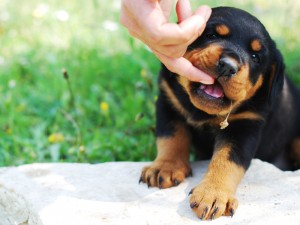
With sharp puppy teeth, they're cute little land sharks!
If you happened upon this page and you own a different breed of dog, read on. The
information herein applies equally to all breeds of dogs.
Lets first dispel some myths about Rottweilers. Rottweilers aren't vicious dogs
by nature. By nature a Rottweiler is a calm, confident, intelligent and gentile
dog. They thrive in family settings due to their highly developed pack oriented
instincts. They are often referred to as velcro dogs because they will stay by your
side at all times. Our previous rottie, Sissy, was by my wife's side always. She
preferred if I was with them but if she had to choose who she was going to stay
beside, it was my wife.
Any time you hear of a vicious Rottweiler (or any other breed for that matter),
you can thank the idiot owner for teaching it to be that way. The dog didn't learn
aggression on its own. They have to be taught to be aggressive and they're not particularly
eager learners of the behavior.
Back in the 1960's when dog fighting became popular, there were attempts to teach
Rottweilers to fight. It was well known even back then that a Rottweiler has twice
the bite force of a Pitt Bull. In fact Rottweilers have the highest bite force of
any domestic breed. What dog fighters found, however, is that Rottweilers won't
fight. Making lousy pit fighting dogs, Rottweilers were soon given up on by fighting
dog breeders.
To understand the problem of
learned aggressive behavior in any domesticated dog you simply
need to understand their owners. I know a young man who bought a Pitt Bull. He's
a macho, loud mouthed, bling oriented, night clubbing party boy. You know the type.
Naturally, he wants a Pitt Bull as a status symbol. The dog's name is Killer. Are
you starting to get the picture? As you can well imagine, he raised the dog to be
an unsocialized and aggressive biter. They're a "bad" team and the owner thinks
this is cool. The dog will likely wind up in a kill shelter once he bites the wrong
person. Such is the fate of dogs owned by such idiots.
Why does your Rottweiler puppy bite?
Lets understand the
biting behavior of your little fur lined crocodile, why it is normal, and why it
does not mean that you have a puppy predispositioned towards viciousness. Then lets use your puppy's pack
instinct to stop the behavior more abruptly than you might think possible.
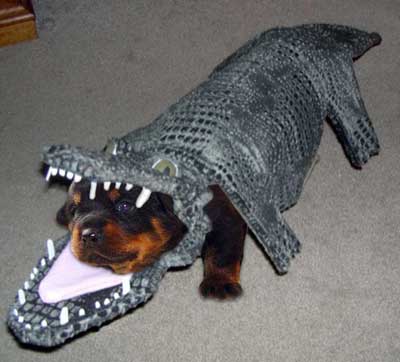
Rottweiler puppies can be fur-lined crocodiles
Before leaving their litter, puppies learn and assert their rank in the pack by
pushing, growling and biting their litter mates. The pups that push and bite the
most rise to the top of the pack rank. Those that back down fall to lower rank and
become submissive subordinates. The puppy that bites and shoves the most gets the
best place at mom's teats at feeding time and has greatest access to other resources.
This is basic canine pack behavior being expressed even at one or two weeks of age.
When your puppy first comes into your home, he instinctively needs to know his rank
in your pack. He will test to find his rank the only way he knows - push, growl,
and bite. Now you understand why he's being a normal puppy.
It is important to understand that dogs of lower rank in the pack do not bite or
challenge higher ranking pack members once rank is established. They avoid confrontation
with the pack leaders (also known as the alphas) at all cost. They know their place and understand
full well that any challenge offered to the alphas cannot end well. Your puppy
has this instinct well developed long before he arrives to your home. It is this
instinct we will use to end the biting and challenging.
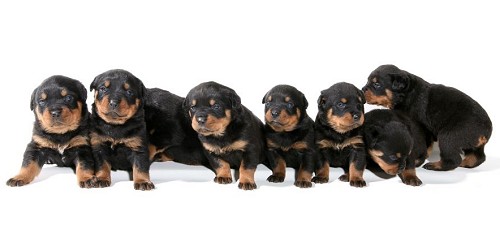
Littermates test each other for pack ranking at a very young age
Your puppy doesn't yet know you're the alpha pack leader - the highest ranking member
of the pack. So, it is time for you to assert your position and let him know. In
doing so, you will be amazed at how quickly your little land shark will
turn into a loving (non-biting) and happy pup from heaven above. It is important
to reiterate that the biting and challenging is occurring because the puppy is testing
your pack rank. Once he realizes you're the pack leader the behavior will stop. The transformation
will start to show within just a few days if you follow the instructions below.
Pack Training your Rottweiler Puppy
First and foremost, if you haven't started to crate train your puppy, get started immediately. This is an absolute must. In the wild,
mother dogs protect their pups in a den. The pups are not permitted to leave the
den unless the mother directs them to follow. The den is a place of safety and comfort.
The crate fulfills the same purpose. It is a place your puppy, and later your full
grown dog, will use as his place of rest and comfort. Under no circumstances should
you punish your puppy by sending him to his crate. Doing so undermines the whole
purpose of crate training. His crate should not be a place of punishment but rather
his sanctuary.
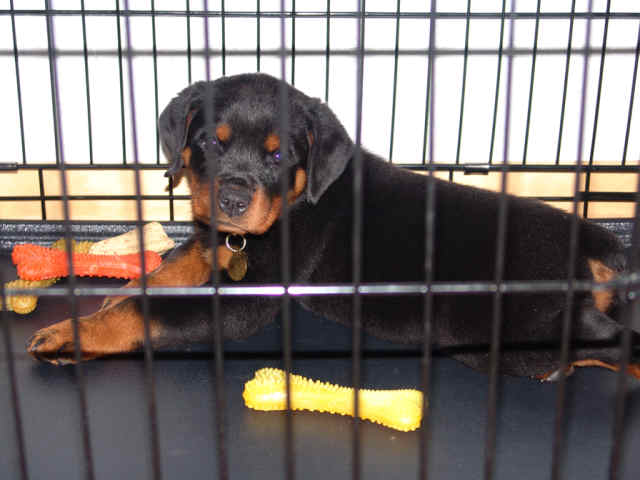
Rottweiler puppy in his crate
Your puppy must sleep in his crate. Do not allow him up on the bed or couch and
do not lay on the floor to play with the pup. The pack leader does not share it's
sleeping spot with subordinates and it will not lay down before subordinates - a
submissive behavior that says "I'm lower ranking than you". Also, do not elevate
your puppy's crate to the same level of your bed or above you to keep an eye on
him. The pack leader always chooses high ground for his sleeping spot.
Another advantage of crate training is it makes it much easier for your dog to travel
and stay with you in hotels or with guests. It provides your dog with a familiar
and comforting place he can call home away from home. Our Rottweiler, Joy, always
sleeps in her crate when traveling. We leave the door open. When she needs to relax
or go to bed for the night, she crawls into her crate on her own and snuggles in.
I've stressed the importance of crate training because it is an essential part of
the broader task of pack training. However instructions on how to crate train your
puppy is beyond the scope of this post. There are a number of excellent references
on the Internet that you can Google for more information and assistance. An excellent
resource for information on all things Rottweiler is
www.rottweiler.net.
Do not initially allow your puppy free house privileges. If he is out of the crate
and in the house he needs to be on a leash. I know this sounds silly but he needs
to learn that you own the house and his access to any place in the house is under
your control. Mommy dog teaches her puppies that she decides where they can follow
and when. You are teaching the same lesson. Doing so actually builds his trust in
you, a feeling of security for him, and a secure developmental platform for the
puppy to explore his new world without anxiety or fear. It builds a foundation for
confidence in your dog that will become important later in life.
When taking your puppy outside, he needs to be on-leash irrespective of whether
you have a fenced yard. If your puppy gets fixated on something he should leave
alone, there should be no reason to pick him up and take him away from it only to
have him return to it immediately. A tug on leash is all that should be required.
It doesn't give him the opportunity (or rank) to decide that he will return to whatever
it is you took him away from. When you give a tug on the leash say "leave it". This
is a safety command he will learn later when he starts beginner's obedience training.
By then, he'll already have a concept of what the command means and will be ahead
of his class.
Don't leave your puppy's toys laying around. Keep them in a box he does not have
access to. When it is play time, take one toy out of the box (you choose the toy)
and make your puppy do something to get it. For example, if the he knows how to
sit, then command the pup to sit first before getting the toy. If he doesn't know
any commands yet, lower an empty hand to his level and let him lick it or touch
it with his paw. If he nips you then make a loud cry, withdraw your hand, and turn
your back to him and ignor him for 15 to 30 seconds then try again. DO NOT SHOVE
OR SMACK HIM!!! Doing so undermines the trust he needs to have in you as a fair
pack leader. Finally he will get the message that nipping doesn't get the toy and
worse, results in rejection. Once he does something nice for you then give him the
toy. At the end of play time, make sure he sees you put the toy back in the box.
The whole point of this exercise is your puppy doesn't own any toys. They are your
toys and he gets to play with them when you allow him to. In a dog pack, the alpha
owns everything. The subordinates get things when they do something for the alpha.
Being in control of your puppy's toys is a strong message to him that you are the
pack leader. If he is in control of his toys, then he's the pack leader and will
expect you to ask for his permission to play with his toys.
How many times have you seen videos of an overly possessive dog snapping at its
owner over a toy or food? This behavior is called resource guarding. It is a behavior
that is borne out of the dog thinking he is the pack leader because he has been
in control of his toys and food since a puppy. Now that the dog is older, he expects
his owner to respect his position as the pack leader. Trying to take any resource
from him will result in immediate reprisal. The relationship is clearly backwards
and it is the owner's fault!
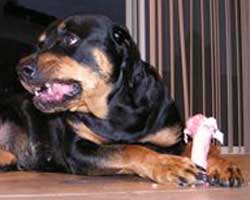
Resource guarding by a full grown Rottweiler can be a dangerous! This is always
the result of an owner who is incompetent in being the pack leader.
Do not play tug games or any other competition games with your puppy for now. Pack
leaders don't allow subordinates to try to take anything from them. Playing tug
and competition games directly communicates to your puppy that you aren't the pack
leader and he has high enough rank to attempt to take the toy from you. Your puppy
can't yet differentiate between companionship playing and pack positioning. Some
trainers recommend that you never play competition games with your rottie. I play
tug with our girl now that she's older but she clearly understands that we're engaging
in companionship play. She's happy that I'm the pack leader and has no desire whatsoever
to change the relationship. If I say "that's enough" she understands that play time
is over.
When feeding time comes, prepare the pup's bowl of food then sit down with it for
awhile. Let the pup see you have possession of the bowl. If it barks for the bowl,
ignore it completely - don't say "no" as you're giving it a response. Your puppy
doesn't understand no. He understands that you're barking at him in competition
for the food. The pack leader does not compete for food. After the pup has settled
down then feed the pup but before setting the bowl down, make the pup do something
for you first (like sit or some other thing it knows how to do). Then allow the
pup to eat. Don't take food away from the pup while it is eating. The pack leader
in a dog pack always eats first then gives what is left over to the rest of the
pack and allows them to eat in peace.
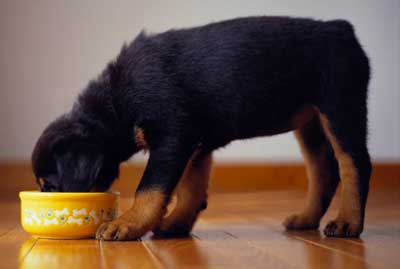
Feeding time is perfect for teaching your puppy that you're a fair and nurturing pack leader
I've read too many articles on the older yank and crank methods of dog training,
which involves "alpha rolling" the dog and dominance training where the owner is
instructed to take food away from the puppy and give it back. If you're going to
start doing these things with a Rottweiler, you better get a good first aid kit.
You're going to need it. If you understand dog pack behavior, you will
understand that you're teaching your dog that you are an unfair bully who can't
be trusted nor fit to be his pack leader. Alpha rolling is an outdated and mean
spirited method of correcting your dog or punishing it into submission. There
are gentle and positive ways to correct your dog when needed. Taking food away
from your puppy in dominance training says "I"m not the pack leader, I'm your
equal and I want your food".
While we're on the topic of feeding, now is an excellent time to teach your puppy
that good things come from the hand of the master. Most Rottweiler puppies inhale
their food like a vacuum cleaner. Some don't so don't be alarmed if your puppy is
more reserved. Before you set down the bowl, prepare a treat that the puppy really
loves. After you set down the food and the puppy starts eating, call his name to
get his attention then hand him a treat. If his attention can't be broken, slowly
lower the treat in front of him until he sees it. He will eagerly take it from you
then quickly return back to gobbling down his food. After he takes the treat, walk
away and let him finish eating. Do this every time you feed him. He will soon look
for the treat while eating. When he reaches this point, now start placing the treat
in his bowl on top of his food as he eats. He is learning that your hand around his food is
a good thing. This teaches him to not resource guard and to see your approaching
him while he is eating is a reward in the offering.
Our Joy is so accustomed to having us around her food that she tries to trade her
food for treats. It's not uncommon for her to try to drop a partially eaten marrow
bone in my lap then look at me as if to say "I'll trade my bone for a treat." She
has no concept of resource guarding as it isn't part of her learning experience.
She willingly shares everything she has with us because she knows that we will be
fair in dealing with her.
Spring boarding from the previous paragraph, always be fair with your puppy. The
pack leader maintains order and controls the resources but is always fair, making
sure the subordinates have access to resources when they are available. A pack leader
most certainly got to the position by asserting his rank but he doesn't maintain
the position by bullying pack members. In the wild, a pack leader (or alpha) won't
hold the position for long if he isn't a dog confident in his leadership qualities
and ability to provide for the pack. The key is to learn to think like a pack leader
in dog terms. It is the only thing your young pup understands intuitively.
Start obedience school as soon as your puppy has had its shots - the sooner the
better. I cannot stress enough that professional obedience training for a Rottweiler
is not optional. Our Rottie, Joy, has been in professional training ever since she
was 12 weeks old. She is now a year old and in advanced training. She will remain
in training until she is around two years old and has received her CGC (Canine Good
Citizenship) and service certifications. So she'll be in training for up to two
years. Keep in mind that the professional trainer does not train the dog. The trainer
trains you to train the dog so approach training from that vantage point. The advantages
of obedience training are:
- It teaches your puppy to have a working relationship with you. In dog terms, it
is a pack bonding experience.
- Your dog learns safety commands like come, stay, leave it, and drop it. There's
nothing more tragic than a puppy that won't come when called and runs out into traffic.
Puppies can be taught to come at a very early age. Our Joy learned to come unconditionally
at the age of 14 weeks.
- It provides a wonderful opportunity for socialization. The puppy learns new sounds,
hopefully trains with other puppies, and learns to accept instruction from both
you and the trainer.
- By attending classes for training and training exercises at home, the puppy learns
to generalize obedient behavior. In other words, he learns to sit at home, sit outside
the home or anywhere he is given command.
- The puppy learns human etiquette. Since Rottweilers are such a large and powerful
breed, understandably many people are afraid to approach you on the sidewalk when
you're out for walks. Our Joy has learned that when someone is approaching us we
take her to the side and stop. She is to immediately lay down on command and show
no attention to the approaching person. When the person sees her so well behaved,
they are less apprehensive about passing us. They will often remark about what a
beautiful girl she is and more often than not, ask if she can be petted. She knows
the routine and is hoping to be petted.
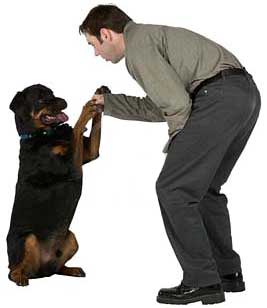
Plan on spending at least one to two years training your Rottweiler puppy. It's not optional!
All of the above suggestions are a good practical start to get your pup turned
around. They may seem stern and counter to your desire to have good times with
your pup but before good times can be had, the pup needs to respect you as his
pack leader. Once he learns, the biting will stop and his behavior will change
to wanting to please you. When he starts to respect your position as pack leader
you can start to provide more privileges but only as the pup earns them by good
and respectful behavior.
For more resources on training your pup, look up NILIF (Nothing In Life Is Free)
training on the web. It is an excellent methodology that I use with great success.
A few closing thoughts
Many people buy Rottweilers as protection dogs. That's a huge mistake. Go back
and re-read the first few paragraphs in this post. Rottweilers, while they have
a keenly developed sense of pack structure, are not good protection dogs. You
would do better to buy yourself a tactical shotgun as it will be far more
reliable protection. Besides, no dog is impervious to some punk's 9mm handgun.
If you happened upon this post and you're thinking of buying a Rottweiler puppy,
be prepared to spend the first one to two years of the puppy's life in professional
training. It is something you must be committed to before picking out your puppy.
As I said above, it's not optional. If you want a dog that doesn't require such
a commitment, get a breed that isn't so pack and prey driven - a Pomeranian for
example.
Don't feed into puppy mills. In other words, don't buy from back yard breeders,
pet shops, newspaper adds, or internet breeders. Most dogs sold by such operations
are inbred and inferior in conformance, health, and temperament. A reputable breeder
does not advertise their pups in the newspaper or sell them to pet shops. Nor do
they broadcast on the internet that they have three dogs left for sale. A reputable breeder almost always has a waiting list so plan
on waiting several months to a year or more for a quality Rottweiler. Also plan
on submitting yourself to an interview by the breeder. A reputable breeder will
want to make sure the puppy is going into a home that will care for its needs and
provide it with proper training and socialization.
Finally, a reputable breeder will provide you with health certification of the
puppy - typically genetic testing and hip dysplasia guarantees. Select a breeder
that breeds for conformance and temperament. Prefer a litter that has disparate
genetic lines. For example, the sire is from the East Coast and the Dam is from
the West Coast. Our Joy's sire is from Yugoslavia and is of a well recognized
European champion blood line. Her Dam is from an international champion blood
line from the United States. Picking a breeder that is selective of the blood
lines reduces the chances of your puppy inheriting genetic abnormalities like
heterozygosis (which predisposes the breed to cancer), heart
problems, and avoids problems with bad temperament resulting from inbreeding.
To find a reputable breeder, go to local "working breed" dog shows and ask the Rottweiler
owners who they recommend. Some of them are reputable breeders themselves. Alternatively,
inquire at www.rottweiler.net, one of my favorite Rottweiler forums. There are a
number of highly regarded breeders that offer advice on the forum who can steer
you to a good breeder in your area.
Good luck with your little guy or girl. If you raise your puppy properly, it will
be the most cherished companion and helper throughout its life. And don't forget...
...this cute little Rottweiler puppy...
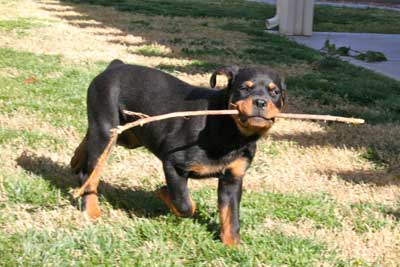
Our Joy at 12 weeks of age
... will become a powerful
110 pound Rottweiler like this!
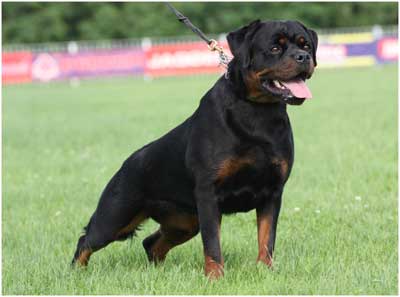
Joy's grand sire, "Benny Overtaken By Darkness" - European champion (2008).
Get started with your training now!
Update: Nov. 11, 2014: In response to numerous requests, I've put together a short video of Joy following basic commands - stay, come, sit, lay down, and heel. She is trained off-leash. To see how well the NILIF method of training that I discuss in this article works, watch the video. Enjoy!